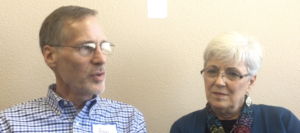 Years ago, Julie and I invited a group over to the house for lunch following Sunday services. One of the women who ate with us was a tiny thing—100 pounds dripping wet! But she was wearing a pair of stiletto heels and proceeded to poke holes in my linoleum floor with every step she took. I had to re-floor my entire kitchen.
Years ago, Julie and I invited a group over to the house for lunch following Sunday services. One of the women who ate with us was a tiny thing—100 pounds dripping wet! But she was wearing a pair of stiletto heels and proceeded to poke holes in my linoleum floor with every step she took. I had to re-floor my entire kitchen.
And I’m glad. That little incident taught me a great lesson about ministry: “the Stiletto Principle.” As I scraped up the Swiss cheese that was my old linoleum floor and replaced it with tile (no more stiletto heel damage for me!), I contemplated the truth that even a small amount of weight focused onto a single point can really make a mark. From that time on, I’ve been fascinated with the possibility of leading church in such a way that the full weight of the church can be brought to bear on one, strategically chosen point and—to God’s glory—make a mark on the world. [Hence, the graphic that accompanies this entire series—a stiletto-heeled shoe.]
Stephen Covey (Seven Habits of Highly Effective People) asks a question that every church and every church leader should consider: Do we live out of our Circle of Concern or our Circle of Influence? As we will see, Covey starts with the right question but does not pursue the answer far enough. By pushing the solution one more step, we (as church leaders) can get to the Stiletto Principle and bring the full weight of the church to bear on a single point that has a chance to make a real difference.
The Circle of Concern
 Imagine three circles of varying sizes—large, medium, and small.[1]
Imagine three circles of varying sizes—large, medium, and small.[1]
The first (and largest) circle encompasses our concerns—things we care about deeply and would love to effectively address. World hunger, peace in the Middle East, the suffering of Christians in Africa, rates of premarital pregnancy, the prevalence of divorce, the scourge of pornography, growing religious apathy … all are examples of matters that matter to Christians. We would gladly “fix” any one of these problems, waving a magic wand to make them all go away.
The reality, however, is that we have no magic wand, no genie in a bottle, no miraculous cure for the world’s ills. While problems like the ones listed above are undoubtedly concerns for us, they are probably not matters we are equipped or empowered to significantly affect. We lack the resources to eradicate world hunger. No one in our church is likely to become Secretary of State and, thus, be in a position to bring feuding factions of Jews and Arabs to peace negotiations. Our particular congregation lacks the kind of computer skills and political clout needed to wage an effective campaign against internet pornography. Just because something concerns us doesn’t mean we can (or should try to) do something about it.
And yet, there are plenty of churches that live out of their Circle of Concern. They make ministry decisions and determine where to devote the church’s resources (time, energy, prayer, attention, money, volunteers) almost solely on the basis of whether a cause is “worthy” and to what extent the church connects to the cause emotionally. “Do we care about this situation? Would we like to do something to help? Is this a good and worthy effort?”
Churches like this are necessarily reactive, driven by circumstance and situation. They are constantly vulnerable to PowerPoint presentations showing pictures of suffering children. All that matters is the need and the urgency they feel to respond to it. Whether they are competent to respond, whether they are called and commissioned to respond, whether their response will actually make a kingdom difference, are questions too rarely asked.
Good things are still accomplished, even in this haphazard way. Compassion is demonstrated. The church engages in lots of “nice” works. But churches that work out of their Circle of Concern keep bumping into one hard reality: needs (and the worthy causes attempting to address them) are infinite … and the resources of even the largest churches are finite. The things Christians are concerned about will always overwhelm the resources we have to devote.
When limited resources meet infinite needs, the end result is either to spread resources more thinly across more and more causes … or jump from cause-to-cause as attention is focused on the latest and greatest need. Thus, the church is reduced to doing a little about a lot (resulting in shallow impact) or constantly shifting focus from need-to-need (resulting in short-lived impact). Either path is a direct route to ineffectiveness.
Some members—in churches that operate in this manner—feel anxious, resentful of constant appeals for involvement and investment, overwhelmed and frustrated at not making a difference in the one area of their lives that should make a difference. They want more than shallow impact or short-term impact. They want more than “nice.” They want their lives to make a difference. They want their church to make a difference. Failing this, many of these members will either drop out of church (and find some other way to make a difference in the world) or they will graduate to those gray ranks of Christians who still go to church but no longer believe the church is God’s instrument for turning the world upside down.
Circle of Influence
 The second (medium-sized) circle represents our sphere of influence—those things we are concerned about and can actually have a significant impact upon. Here, the question is not simply, “Do we care?” but “Are we equipped?” … “Has God called us?” … “Are we positioned to make a difference in this matter?”
The second (medium-sized) circle represents our sphere of influence—those things we are concerned about and can actually have a significant impact upon. Here, the question is not simply, “Do we care?” but “Are we equipped?” … “Has God called us?” … “Are we positioned to make a difference in this matter?”
Churches, like individuals, have things they are equipped to do and things they are not. Certain churches have the talent and passion and spiritual gifts to excel in particular ministries. Other churches—blessed with different talents, expertise, and opportunities—are equipped to excel in other ministries. Every church is equipped to make a significant difference, to make a meaningful mark on someone … in some way … under certain conditions … given the right opportunities. The trick is finding the need that matches the gifting.
Churches that live in their Circle of Influence are determined to match ministry to gifting. They use their competencies to determine where to devote their resources. The basic assumption is that God does not call us to any work for which he has not equipped us and granted us the necessary resources. The basic question in such churches is not “Is this a worthy cause?” but “What cause has God gifted us to effectively address?” With an abundance of “worthy causes” and the hard reality of finite resources, these churches look first to how God has gifted them and then to the needs that best fit those giftings.
Such churches are more proactive in their ministry. They go in search of ministry opportunities that God has equipped them to accomplish. They utilize a basic filter for determining whether to become involved with a particular cause: is the cause something God has prepared them to accomplish by giving the church the right people, skills, experience, passion, and resources?
Even proactive churches, however, can founder on the rock of the “merely good” and fail to exercise the discipline necessary for devoting themselves to the “best.”
Sometimes churches focus on matters they care about and are competent to influence even though the matters in question don’t really mesh with kingdom priorities.[2] Much mischief follows when churches allow kingdom business to be usurped by lesser things—even when those “lesser things” are still good. And it happens all the time: churches that stress denominational agendas above growing people into the image of Christ … churches that decide to influence social policies through voting blocs and boycotts rather than by living out the cross … churches that emphasize prosperity or positive mental attitude as a substitute for the gospel.
More often, however, churches that live in their Circle of Influence make the mistake of missing the “best” not because they focus on the wrong thing but because they fail to focus enough.
Even when a church narrows its ministry options to matters they both care about and are competent to address, the list is still daunting. Most churches have been equipped by God with all manner of skills and abilities. They are home to members with a wide variety of gifts and interests. They find themselves “blessed” with various and competing competencies that threaten to divide focus and dilute resources. This group of members wants to plant churches. That group wants to fund mission programs. Another group is committed to the urban poor. Yet another is deeply invested in a daycare program, the youth ministry, worship renewal, small groups, etc.
As we hinted in a former article (Key Mission Passages) and will explore more fully in the next article (The Need for Balance), the mission of any church must be larger than one thing. No church, for instance, has permission to focus on evangelism and ignore holiness.
That said, more churches fail to be effective because they won’t focus or try to focus on too many things than because their focus is too limited. Four or five competing priorities can be as lethal to the impact of a church as none at all. Even good ministries can ruin the ability of a church to focus if too many of them are given equal weight and allowed to compete for the finite resources of the church.
Circle of Commitment
 The third (and smallest) circle represents the area of commitment—things we care about, have the competencies and opportunities to impact, and make a commitment to focus on. The Circle of Commitment defines the area we have intentionally selected as the “main thing” for our congregation.
The third (and smallest) circle represents the area of commitment—things we care about, have the competencies and opportunities to impact, and make a commitment to focus on. The Circle of Commitment defines the area we have intentionally selected as the “main thing” for our congregation.
Stephen Covey limited his discussion of effectiveness to the first two circles (Concern and Influence). He urged readers to live out of their Circle of Influence and saw this as the key to effectiveness.
I don’t believe he went far enough—especially for groups as diverse as the church. As the above discussion indicates, churches can decide to address only matters they both care about and are competent to tackle and still find themselves spread thin and overwhelmed.
One more step is required for churches to truly make a difference: they need to make a specific commitment to a particular focus. The question churches should ask is not “What is the need?” or even “What needs are we equipped to address?” but instead “What one need that we are equipped to address are we willing to commit ourselves to body and soul?”
It’s a question of focus. It’s a matter of intentional dedication. It involves the courage to define the “main thing” your church is equipped, commissioned, and determined to do. It is a ministry choice that allows the church to concentrate its efforts and resources, to bring all its weight to bear on one strategic point for the purpose of making a kingdom mark on the world. It’s an instance of the “Stiletto Principle” come to life in a local church.
Allow me to use a personal example to explain this Circle of Commitment. God has gifted me to do several things well. And I feel responsible to be a good steward of the abilities he has entrusted to me. But juggling too many balls, pursuing too many directions—even when they represent things I care about and am competent to do—spreads me thin and undermines my effectiveness. I am finite. And even good things can interfere with my ability to do the best.
I reached a point in my life recently that demanded more focus. I could keep preaching and writing and leading a church and attending committee meetings and speaking at events and counseling marriages, etc. But I was wearing out. And the harder I ran, the less effective I felt. I was doing lots of good things. But I wasn’t doing my best for God.
I decided to take my love for the church, thirty years of preaching experience, my counseling background, my writing abilities—all that God has made of me and equipped me for over the years—and put them towards consulting with churches who wanted to make a kingdom difference. I resigned my pulpit, handed off the marriages I was working with, changed my writing agenda, freed up my schedule, and focused on doing one thing well—working with ministers and churches that yearned to fly. I have a website devoted to that purpose. I travel every weekend of the year in pursuit of that goal. I say “No” to churches that want me to be their full-time pulpit minister. I feel called by God to a more peripatetic ministry, to work with a range of churches, and to help those churches find the main thing God has commissioned them to do.
I put on the ministerial equivalent of stiletto heels and determined to punch some holes in the world’s linoleum.
I believe churches can and should do the same thing. Of all the needs we are concerned about and equipped to address, what is the one place we want to put our weight as a church and make a kingdom mark? Finding the right spot, getting that “one place” right, is an exercise in listening to God, discerning his will, and responding to his calling. It is not an easy or simple thing to decide where to concentrate your congregation’s weight, who to focus on, how to make a difference that furthers a kingdom agenda. This series of articles is an attempt to help congregations with that process.
But the process is pointless if it doesn’t begin with the idea that churches should make a difference, that churches make a difference by focusing rather than dispersing their efforts, and that the discipline of focus, while difficult, permits the church make a significant mark on the world and a significant impact for the kingdom.
[1] Again, I am grateful to Stephen Covey (7 Habits of Highly Effective People) for his insights here. He suggests only the first two circles: concern and influence. By adding the third—“commitment”—we can get at the real power of focus.
[2] There were those in the Jerusalem church (for instance) who wanted the church to make Moses a principal emphasis. They cared deeply about the Law and, as the “home church” of Christianity, could have radically influenced the missionary message of the church. (See Acts 15.) Paul and the Jerusalem leaders—though Hebrews themselves and thankful for the Law—would not permit an emphasis on Moses to hijack the greater, better agenda of salvation through faith in Jesus.


